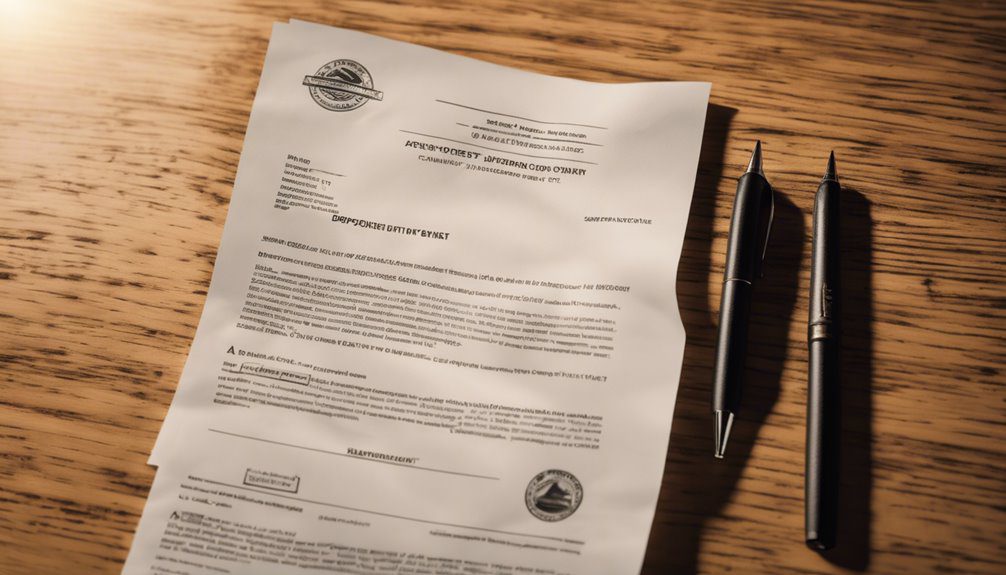If you're considering a utility deposit bond with Santee Cooper, it's essential to understand how this option can benefit you. These bonds offer a way to secure utility services without the burden of hefty cash deposits, especially if you have a less-than-perfect payment history. However, navigating the eligibility requirements and the application process can be a bit complex. So, what should you know about the potential costs and advantages, and how does it compare to other available options? Let's explore these critical aspects further.
Understanding Utility Deposit Bonds

When you're setting up utility services, understanding utility deposit bonds is crucial. These bonds act as a safety net for utility companies, ensuring they receive payment even if a customer defaults. Essentially, a utility deposit bond guarantees that you'll fulfill your payment obligations, providing assurance to the service provider about your creditworthiness.
Typically, if you have a history of late payments or no established credit, the utility company might require a bond instead of a cash deposit. This bond can be obtained through a surety company, which will evaluate your financial situation before issuing it. You'll pay a premium, usually a fraction of the total bond amount, which aligns with your credit risk.
It's important to know that utility deposit bonds don't eliminate your responsibility to pay your bills. Instead, they serve as a financial backup for the utility provider. If you fail to pay, the bond company might cover the costs, but you'll still owe that amount back to them.
Understanding these bonds helps you navigate the utility setup process and avoid potential pitfalls, ensuring you establish services smoothly and maintain a positive relationship with your provider.
Importance of Santee Cooper
Santee Cooper plays a vital role in the utility landscape of South Carolina, providing electricity and water services to thousands of residents and businesses. By ensuring reliable access to these essential services, Santee Cooper supports local economies and enhances the quality of life for many. You depend on this utility not just for your daily needs but also for the energy that powers your community's growth.
Santee Cooper's commitment to sustainability and renewable energy sources showcases its forward-thinking approach. The organization invests in infrastructure and technology that not only meet current demands but also prepare for future challenges. This proactive stance helps maintain a stable environment for economic development, which benefits you as a consumer and taxpayer.
Additionally, Santee Cooper's customer service and community involvement reflect its dedication to the people it serves. Whether through educational programs or assistance during outages, you can see that Santee Cooper prioritizes your needs.
Understanding the importance of this utility helps you appreciate its role in maintaining a dependable supply of electricity and water. Ultimately, Santee Cooper's impact reaches far beyond utility services; it shapes the very fabric of South Carolina's communities.
Eligibility Requirements

To qualify for a utility deposit bond with the Public Service Authority, you must meet specific eligibility requirements.
First, you need to be a residential or commercial customer of Santee Cooper. If you're looking to establish new service, you'll typically need to provide proof of identity and residency or business ownership.
Next, your credit history plays a crucial role. If you have a strong credit score and a positive payment history, you're more likely to qualify without needing a deposit bond.
However, if your credit history shows late payments or defaults, you may need to secure a bond as part of your application.
Additionally, you mustn't have any outstanding balances with Santee Cooper or other utility providers. Clearing any previous debts will help your chances of approval.
Lastly, make sure you're aware of any specific documentation the Public Service Authority requires. This could include financial statements or references.
Bond Amount and Costs
While the bond amount required for a utility deposit bond can vary, it typically reflects the estimated costs of service you might incur. This amount is usually determined by the utility provider based on factors like your payment history, the size of your service, and the type of service you need.
Generally, you can expect the bond to be a percentage of your anticipated utility usage, ensuring the provider has a safety net for potential unpaid bills.
The costs associated with obtaining a utility deposit bond will also depend on the bond amount and the underwriting criteria set by the surety company. Typically, you'll pay a premium that's a fraction of the total bond amount, which means the higher the bond, the higher your premium will be.
It's essential to shop around and compare rates from different surety providers to ensure you're getting the best deal.
Application Process

Once you've determined the bond amount and associated costs, the next step is to navigate the application process for obtaining your utility deposit bond.
Start by gathering the necessary documentation, including your identification, proof of residency, and any financial statements that may be required. You'll also need to provide details about your utility account with Santee Cooper.
Next, reach out to a surety bond provider. They'll guide you through their specific application requirements, which often include filling out an application form and providing the aforementioned documents.
Be prepared to answer questions about your credit history and financial stability, as these factors can influence your approval.
Once you submit your application, the surety company will review it, assess the risk, and determine whether to issue the bond.
If approved, you'll receive the bond documents, which you must then submit to Santee Cooper to finalize your utility service.
Don't forget to review the bond terms carefully before signing. This process might seem daunting, but with the right preparation, you'll secure your utility deposit bond smoothly. Additionally, understanding the surety bond requirements can further streamline your application process.
Benefits of Utility Deposit Bonds
Utility deposit bonds offer several advantages that can enhance your experience as a utility customer.
First and foremost, they provide flexibility. Instead of paying a large cash deposit upfront, you can secure a bond for a fraction of that amount. This means you can allocate your funds elsewhere, making it easier to manage your finances.
Another benefit is that utility deposit bonds can improve your credit profile. When you use a bond instead of a cash deposit, you might avoid tying up your available credit and keep your cash flow healthy. This can be particularly useful if you're trying to maintain a good credit score while handling other financial obligations.
Moreover, utility deposit bonds often come with lower overall costs. Since they're typically less expensive than cash deposits, you'll save money in the long run.
As you maintain a positive payment history, you may even become eligible for a return of the bond, providing an added financial incentive.
Alternatives to Utility Deposit Bonds

If you're considering options other than utility deposit bonds, there are several alternatives that might fit your needs.
One viable option is a cash deposit. This involves paying a set amount upfront, which the utility company holds as collateral. Once your account is in good standing for a specified period, you may get your deposit back.
Another alternative is a letter of credit. This is a document from your bank guaranteeing payment to the utility company if you fail to pay your bills. It can be a smart choice if you have a strong banking relationship and good credit.
You might also explore payment plans. Some utility companies offer flexible payment arrangements that allow you to pay your utility bills over time, reducing the immediate financial burden.
Lastly, consider securing a guarantor. If someone with a strong credit history agrees to co-sign for your utility services, it could eliminate the need for a deposit altogether.
Each of these alternatives has its pros and cons, so weigh your options carefully to choose the one that best suits your financial situation and needs.
Common Misconceptions
While many people might believe that utility deposit bonds are the only option for securing services, that's far from the truth. Many assume that these bonds are mandatory, but in reality, there are alternatives available that can often meet your needs just as effectively.
Some folks think that if they don't have a perfect credit score, a utility deposit bond is their only choice. However, many utility companies also accept payment plans or lower initial deposits based on your payment history.
Another misconception is that utility deposit bonds are always expensive. In fact, the cost can vary widely based on your credit and the bonding company you choose.
A common belief is that these bonds are a permanent requirement, but they can often be released after a certain period of timely payments, freeing up your funds for other uses.
Lastly, some people think that utility deposit bonds guarantee service quality. While they do help secure your account, they don't influence the level of service you'll receive.
Understanding these misconceptions can help you make more informed decisions regarding utility services.
Conclusion
In conclusion, utility deposit bonds from Santee Cooper provide a smart alternative to cash deposits for securing your utility services. They not only help you save money but also make it easier to access essential utilities, especially if you've had payment issues in the past. By understanding the eligibility, costs, and application process, you can take advantage of this option. Don't let upfront cash deposits hold you back—consider utility deposit bonds for your utility needs!


